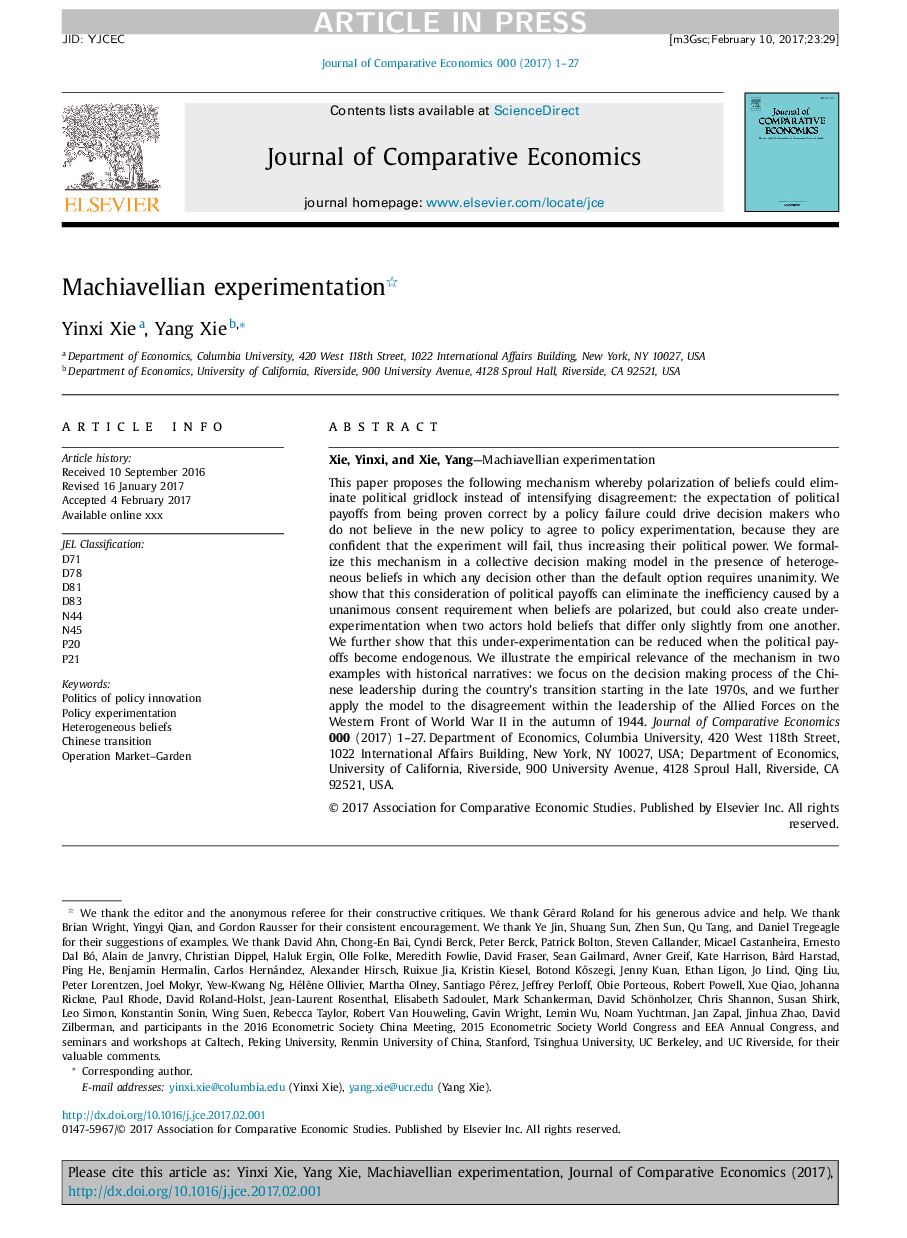| کد مقاله | کد نشریه | سال انتشار | مقاله انگلیسی | نسخه تمام متن |
|---|---|---|---|---|
| 7356930 | 1478413 | 2017 | 27 صفحه PDF | دانلود رایگان |
عنوان انگلیسی مقاله ISI
Machiavellian experimentation
ترجمه فارسی عنوان
آزمایشی ماکیاولی
دانلود مقاله + سفارش ترجمه
دانلود مقاله ISI انگلیسی
رایگان برای ایرانیان
ترجمه چکیده
این مقاله مکانیسم زیر را پیشنهاد می دهد که به موجب آن قطب بندی اعتقادات می تواند به جای تشدید اختلافات از بین بردن خط مشی سیاسی بیفزاید: انتظار پرداختن سیاسی از اثبات درست بودن یک شکست سیاسی می تواند تصمیم گیرندگان را که به سیاست جدید اعتقاد ندارند، زیرا آنها اعتماد به نفس می کنند که آزمایش شکست خواهد خورد و در نتیجه قدرت سیاسی آنها را افزایش می دهد. ما این مکانیزم را در یک مدل تصمیم گیری جمعی در حضور باورهای ناهمگونی که در آن هر تصمیم غیر از گزینه پیش فرض، یکسان است، تشکیل می دهیم. ما نشان می دهیم که این توجه به بازپرداخت های سیاسی می تواند ناکارآمدی ناشی از یک نیاز رضایت بخشی را که باعث عقب ماندگی قطبی می شود را از بین ببرد، اما می تواند آزمایش های زیر را نیز ایجاد کند، زمانی که دو بازیگر اعتقاد دارند که اندکی متفاوت از یکدیگر هستند. ما علاوه بر این نشان می دهیم که این کم تجربه می تواند زمانی کاهش یابد که بازده های سیاسی داخلی می شوند. ما روابط تجربی مکانیسم را در دو نمونه با روایات تاریخی نشان می دهد: ما بر روند تصمیم گیری رهبران چینی در طی گذار از کشور در اواخر دهه 1970 متمرکز هستیم و ما همچنان مدل را به اختلاف درون رهبری نیروهای متفقین در جبهه غربی جنگ جهانی دوم در پاییز 1944.
موضوعات مرتبط
علوم انسانی و اجتماعی
اقتصاد، اقتصادسنجی و امور مالی
اقتصاد و اقتصادسنجی
چکیده انگلیسی
This paper proposes the following mechanism whereby polarization of beliefs could eliminate political gridlock instead of intensifying disagreement: the expectation of political payoffs from being proven correct by a policy failure could drive decision makers who do not believe in the new policy to agree to policy experimentation, because they are confident that the experiment will fail, thus increasing their political power. We formalize this mechanism in a collective decision making model in the presence of heterogeneous beliefs in which any decision other than the default option requires unanimity. We show that this consideration of political payoffs can eliminate the inefficiency caused by a unanimous consent requirement when beliefs are polarized, but could also create under-experimentation when two actors hold beliefs that differ only slightly from one another. We further show that this under-experimentation can be reduced when the political payoffs become endogenous. We illustrate the empirical relevance of the mechanism in two examples with historical narratives: we focus on the decision making process of the Chinese leadership during the country's transition starting in the late 1970s, and we further apply the model to the disagreement within the leadership of the Allied Forces on the Western Front of World War II in the autumn of 1944.
ناشر
Database: Elsevier - ScienceDirect (ساینس دایرکت)
Journal: Journal of Comparative Economics - Volume 45, Issue 4, December 2017, Pages 685-711
Journal: Journal of Comparative Economics - Volume 45, Issue 4, December 2017, Pages 685-711
نویسندگان
Yinxi Xie, Yang Xie,
